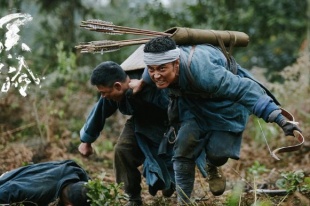Retelling Southwest China’s tunpu culture through film


More than 600 years ago, Zhu Yuanzhang, the first emperor in Ming Dynasty (1368-1644), sent around 30,000 soldiers to station in Southwest China’s Guizhou after crushing a rebel army. Their descendants have lived there over generations to form a distinctive culture called tunpu (fortified villages).
The Tunpu, a new movie inspired from the culture, held a news event at the 9th Silk Road International Film Festival, which has recently concluded in Xi’an, the capital of Shaanxi province, on Jan 3.
Set during the War of Resistance against the Japanese Aggression (1931-45), the movie stars actors Zhang Danfeng and Zhang Aoyue as two descendants of the stationed Ming Dynasty soldiers, who both fall for a native woman who make their living picking tea leaves. When the Japanese invaders attempt to occupy their village, the two put aside their personal discord to join hands to fight the enemy and sacrifice their lives for the safety of the hometown.
Under helm by director Yu Weiguo, known for producing blockbusters like Crazy Stone and No Man’s Land, the movie invites award-winning filmmaker Yuan Xibo as the producer and veteran cinematographer He Shan, known for the acclaimed movie Wrath of Silence.





































